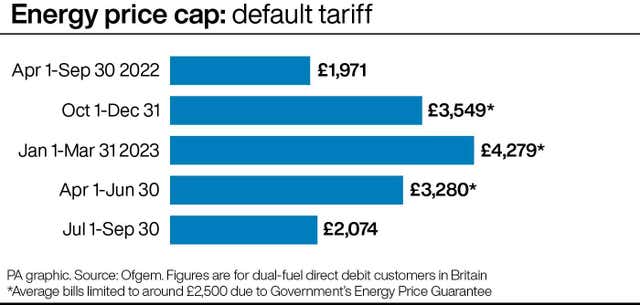The cut to Ofgem’s price cap raises the possibility that consumers could soon be able to switch supplier again if firms compete for business on the back of falling wholesale prices.
There have been no switching tariffs available to consumers for well over a year.
Consultancy firm Cornwall Insight said it hopes to see the reappearance of more competitive fixed-rate energy tariffs as prices begin to stabilise, providing consumers with additional options to manage their energy costs.
Which? Energy editor Emily Seymour said: “If prices start to stabilise, we may see some providers offering competitive fixed-price energy deals for the first time in well over a year, so it will be worth doing a bit of research to see if there’s a deal that could be cost-effective while also offering good customer service and low exit fees.”
Natalie Mathie, energy spokeswoman at Uswitch.com, said: “The first price cap drop in two years is confirmation that the tide is finally turning for long-suffering energy customers.
“The average household can expect monthly direct debits to be set at £173, although typical seasonal usage may only see you spend £110 a month over the summer.
“While this is good news, the majority of homes are on standard variable tariffs and now subject to the volatility of price cap changes every three months.
“This is a watershed moment for energy suppliers who can now look to start offering fixed deals again, given the market conditions – and would help to encourage genuine competition in the retail energy market.
“Customers should have the choice of whether to lock in the benefits of lower wholesale prices for 12 months, just as they do in the mortgage market. If deals are priced fairly, this could offer much needed peace of mind, particularly over the high usage winter period.
“After a long spell of having no option but to try to reduce their usage at home, now is the time for energy customers to start paying attention to the market again.”
Martin Lewis, founder of MoneySavingExpert, said some customers signed up to “very high” fixed-rate deals last year as prices rocketed, which they should now consider leaving.
He said: “This time last year, with prices rocketing, some people took very high fixed-rate deals.
“Then the Government launched the Energy Price Guarantee (EPG) and, for fairness, those whose fixes were more expensive than the EPG had their tariffs subsidised so they dropped to the same level.
“From July as the EPG subsidy will be set as zero, that subsidy will be removed and those fixes will go back to their original price.
“For people on those fixes, it is worth considering switching to a price-capped standard tariff – possibly even if you need to pay exit fees.”

The firm said customers could significantly reduce their bills by matching their energy consumption with lower-priced periods, claiming that an average household on the tariff would have saved 4% compared with the new cap of £2,074 over the last year.
However it warned that wholesale prices were expected to rise later in the year as demand grows.
Rebecca Dibb-Simkin, chief product officer at Octopus Energy Group, said: “The energy market is changing rapidly, and we believe it’s essential for consumers to have the tools to harness this change for their benefit. We’re glad we can bring our popular tracker product back to the market, allowing customers to become an active part of the future energy system once more.
“By creating a transparent tariff that allows customers to access wholesale rates and plan their energy consumption accordingly, we’re empowering customers to become actively and directly involved with the energy market, and see how prices rise and fall.”






